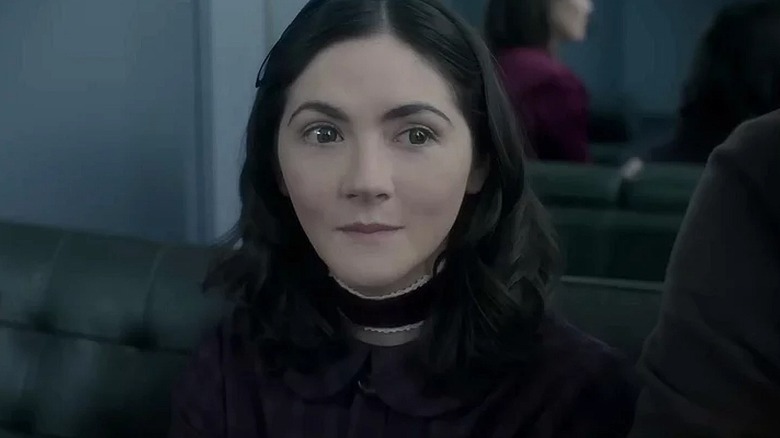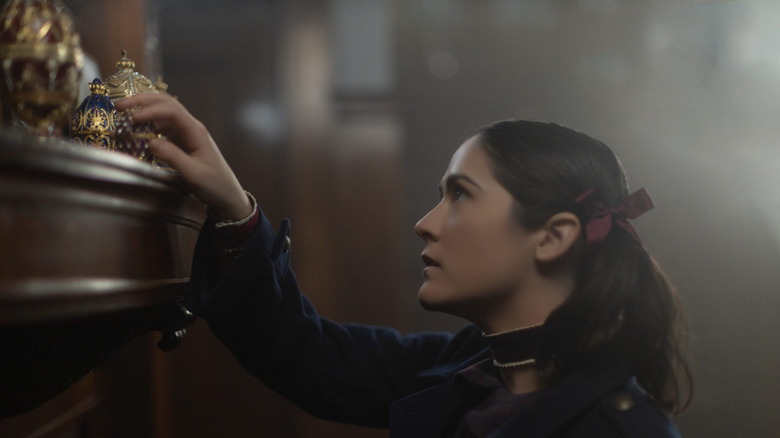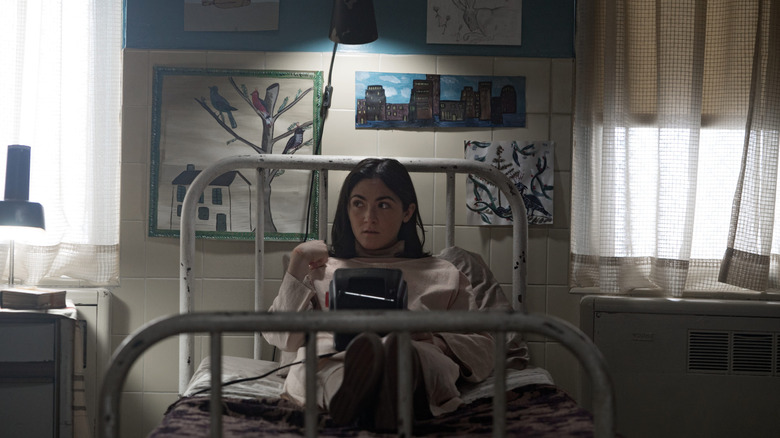Orphan: First Kill Review: Esther's Bloody Return
- Avoids fan service to do its own thing
- A delightfully wild second half
- Isabelle Fuhrman is fantastic
- The first half follows the formula of the original too closely
- Tries so hard to hide the twist, many plot details make little to no sense
- The de-aging CGI often distracts from the drama
If you go into "Orphan: First Kill" expecting the origin of Esther's murderous ways, then you'll be sorely disappointed. Director William Brent Bell — picking up from Jaume Collet-Serra, who helmed the 2009 original — knows exactly why you've come to watch an "Orphan" prequel and wastes no time reintroducing us to Isabelle Fuhrman's pint-sized terror long after she's already embarked on her first killing spree. The title may promise us Esther's first kill, but Bell, alongside screenwriter David Coggeshall, understands there are few thrills to be had in a film in which the character isn't a cold-blooded killer from the outset.
It's in this first half where the prequel is at its weakest, often feeling like an unsatisfying beat-for-beat retread of the first film's narrative structure but from a shifted perspective — after all, this time, we already know who Esther really is. It helps make the audacious narrative left turn at the halfway point feel all the more welcome, though, even if that does only serve to make "First Kill" look more inconsistent on the whole. You have to overlook several leaps of logic in the first half in order to enjoy the wildly entertaining second, which proves a lot harder to do than it should.
A retread that becomes something more
The story begins in Estonia, where Esther is already in a psychiatric facility for previous murders. After an outside visitor comes to her ward, she senses a window to orchestrate her long-planned escape, and with more bodies piling up behind her, she figures it's best to flee the country. Looking through various missing person listings, she finds the missing American child Esther Albright and aims to reinvent herself as the wealthy family's long-lost daughter. However, the Albrights, led by Julia Stiles' matriarch Tricia, have secrets of their own, and it isn't long before Fuhrman's character realizes that she is the one in clear danger.
The opening half of "First Kill" feels very deliberately written to wrongfoot the audience about the direction the narrative is headed. Without spoiling anything specific about the story itself, the twist reveal means that you have to suspend disbelief at the way certain characters acted in several situations in the first half, even though they had no reason to hide anything about themselves due to who they were in the company of during those moments. As we're seeing this story from Esther's perspective, offering a mirror image of the fixed parental perspective of Collet-Serra's film, it feels like certain character interactions were included solely to keep the audience off the scent of the twist — something which did make for an unexpected reveal I didn't see coming but doesn't make a lick of sense when factored into the drama before it. The twist is designed to generate shocked gasps from packed opening night crowds, which makes it somewhat disappointing that it's making its debut on a streaming service rather than in theaters.
From that midpoint on, "First Kill" becomes more than a perspective-shifted retread of the 2009 film, telling a new story that manages to flesh out the character of Esther — pulling off the challenge of giving her more depth and making her the empathetic focus in the story, without making the audience forget she's a killer. This is elevated further thanks to Fuhrman's performance, which manages to overcome a plethora of obstacles in the form of distracting body doubles and de-aging CGI facelifts to extend some true sympathy for the devil. In the first film, Esther's desperate need for love and lack of trust in every family unit was an immediately understandable shorthand that helped the audience grasp onto why she would be wreaking havoc. Here, the experiences that underpin those emotions are explored with more depth, making for the rare case where a horror villain manages to remain an interesting character even after unpacking their trauma and laying their motivations bare.
Forget fan service
Despite this, the film is best enjoyed as a pitch-black comedy, which is at its best from the moment it decides to do its own thing rather than simply pay lip service to the original. There are exceptions to this; we know from the 2009 film that Esther's family died in a house fire, and Bell gets a lot of comic mileage out of teasing all the possible ways this could go down. This is an unavoidable narrative obstacle, but it's the only bit of storytelling directly tied to "Orphan" the director and screenwriter prove interested in. Even when the second half's left turn offers the added benefit of providing extra context for the main character that enhances the enjoyment of the earlier film, "First Kill" still stands as a standalone story separate from it.
The film succeeds on its own terms because it understands that it's only tied to the original via continuity, freeing itself from the restrictions of fan service and understanding the only real obstacle is the way the story ends. Prior to that, they have complete freedom to tell the story they want. It's largely why the film feels so satisfying in its later stages, once it's finished mimicking the broad strokes of the original's narrative beats in the first half in order to take the kind of risk you wish more horror prequels would have the courage to.
And yet, the strange thing about "First Kill" is that it is so uneven due to that first half, it's not as successful as it would be if it were as consistently daring as its latter stages. It's both a film that exists to show that prequels are at their strongest when not shackled by their source material and one clearly burdened by a self-conscious desire to deliver a twist even more bananas than the famous one last time, keeping its cards so close to its chest the first half of the film falters around it due to the several gigantic logic leaps it takes in order to hide it. As a fan of the original, I was more than satisfied by the end, even if I wasn't satisfied on the whole.


